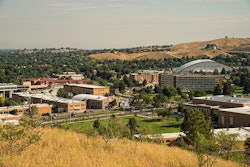OMAHA, Neb. ― A federal judge has ruled that Creighton University’s medical school must provide a deaf student with special equipment and interpreters to allow him to finish his last two years there.
But the judge also ruled Friday that the university does not have to reimburse Michael Argenyi for more than $100,000 of his own money he spent in his first two years for those resources.
Argenyi was accepted to Creighton’s medical school in 2008 after disclosing that he was hearing impaired and requesting accommodations for his disability to allow him to follow lectures and communicate with patients.
He sued in 2009, after leaving the Omaha school when the university refused his requests for interpreters — even though he offered to pay for them himself.
Argenyi was an infant when he began using hearing aids for his disability, but his parents primarily communicated with him through spoken language. Argenyi does not know sign language, relying instead on “cued speech,” which uses hand signals to distinguish sounds that appear the same on a speaker’s lips.
While an undergraduate student at Seattle University, Argenyi used a system that transcribes spoken words into text on a computer screen. With the help of that system and a cued speech interpreter — both of which were provided by Seattle University ― Argenyi graduated in 2008 with a 3.87 GPA.
Creighton did provide some assistance, such as a system in which professors wore a microphone that emitted frequencies that could be picked up by Argenyi’s cochlear implants. But Argenyi said the system was not adequate to accommodate his hearing disability, and one doctor determined it actually reduced Argenyi’s ability to understand his professors.














